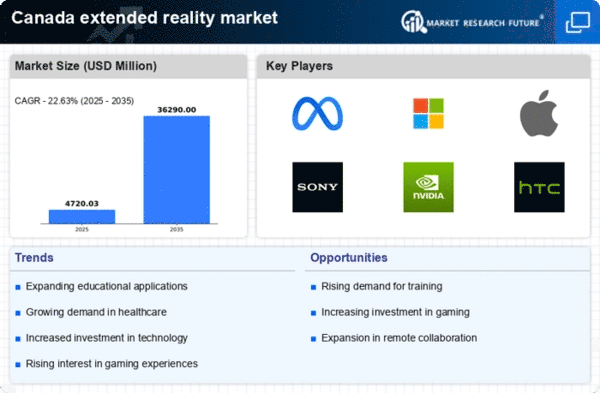Increased Investment in XR Startups
Investment in startups focused on extended reality technologies is on the rise in Canada, reflecting a growing confidence in the potential of the extended reality market. Venture capital funding for XR companies has seen a notable increase, with investments reaching around $300 million in 2025. This influx of capital is enabling startups to innovate and develop cutting-edge applications across various sectors, including healthcare, education, and entertainment. The extended reality market is benefiting from this trend as new solutions emerge, enhancing the overall ecosystem. Investors are particularly interested in companies that leverage XR for practical applications, suggesting a shift towards more sustainable and impactful use cases.
Expansion of XR in Retail Experiences
The retail sector in Canada is increasingly integrating extended reality technologies to enhance customer experiences. Retailers are utilizing XR to create immersive shopping environments, allowing consumers to visualize products in their own spaces before making a purchase. This trend is reshaping the way consumers interact with brands, as the extended reality market provides tools that enhance engagement and personalization. By 2025, it is anticipated that the market for XR in retail will grow by 30%, driven by the need for innovative solutions that attract and retain customers. Retailers that adopt these technologies are likely to gain a competitive edge in an increasingly digital marketplace.
Government Support for XR Initiatives
The Canadian government is actively supporting the development of the extended reality market through various initiatives and funding programs. This support is aimed at fostering innovation and encouraging the adoption of XR technologies across different sectors. In 2025, government funding for XR projects is projected to exceed $100 million, reflecting a commitment to enhancing the technological landscape. The extended reality market stands to benefit significantly from this support, as it enables companies to explore new applications and improve existing technologies. Such initiatives not only stimulate economic growth but also position Canada as a leader in the global XR landscape.
Technological Advancements in Hardware
The extended reality market in Canada is experiencing a surge due to rapid advancements in hardware technology. Innovations in headsets, sensors, and display technologies are enhancing user experiences, making them more immersive and interactive. For instance, the introduction of lightweight, high-resolution headsets has made virtual reality more accessible to consumers and businesses alike. In 2025, the market for XR hardware is projected to reach approximately $1.5 billion, indicating a robust growth trajectory. This growth is likely driven by increased demand from sectors such as gaming, training, and remote collaboration. As hardware becomes more sophisticated, the extended reality market is expected to attract a broader audience, further fueling its expansion.
Growing Demand for Remote Collaboration Tools
The shift towards remote work has led to an increased demand for extended reality solutions that facilitate collaboration. Companies in Canada are increasingly adopting XR technologies to enhance virtual meetings and team interactions. This trend is evident as organizations seek to create more engaging and productive remote work environments. The extended reality market is responding to this demand by offering tools that allow for immersive collaboration experiences, which can lead to improved communication and teamwork. In 2025, the market for XR collaboration tools is expected to grow by approximately 25%, indicating a strong preference for innovative solutions that bridge the gap between physical and virtual workspaces.
















